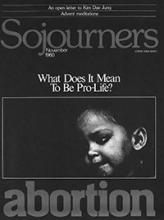This special issue of Sojourners is on abortion. It is overdue. The magazine staff has for several months been in a process of study and prayerful reflection, and the whole community has faced the issue more squarely than ever before. We now feel ready to begin to address this most difficult and controversial subject.
During these months we have tried to make connections between the concerns we have held dear for so long and the question of abortion. Though Sojourners has never been "for" abortion, we have not been clearly and publicly against it either. Very honestly, abortion has not been one of our priorities. Many of our readers have been ahead of us on this issue, pushing and probing with their letters and concern.
Like many, we have often been put off by the anti-abortion movement. Its attitudes toward women and the poor, combined with its positive support for militarism and capital punishment, have been deeply offensive to us and have helped keep us away from the issue of abortion. Serious contradictions, along with the insensitivity of rhetoric and tactics of many in the pro-life movement, have alienated others from their cause--just as, it must be admitted, similar problems in the peace movement have turned many away from peace.
However, the problems and shortcomings of the anti-abortion movement cannot continue to be excuses for us. Our deepest convictions about poverty, racism, violence, and the equality of men and women are finally rooted in a radical concern for life--its absolute value and the need to protect it. It was only a matter of time before the spiritual logic of these other commitments would lead us to a "pro-life" response to abortion as well.
Read the Full Article

